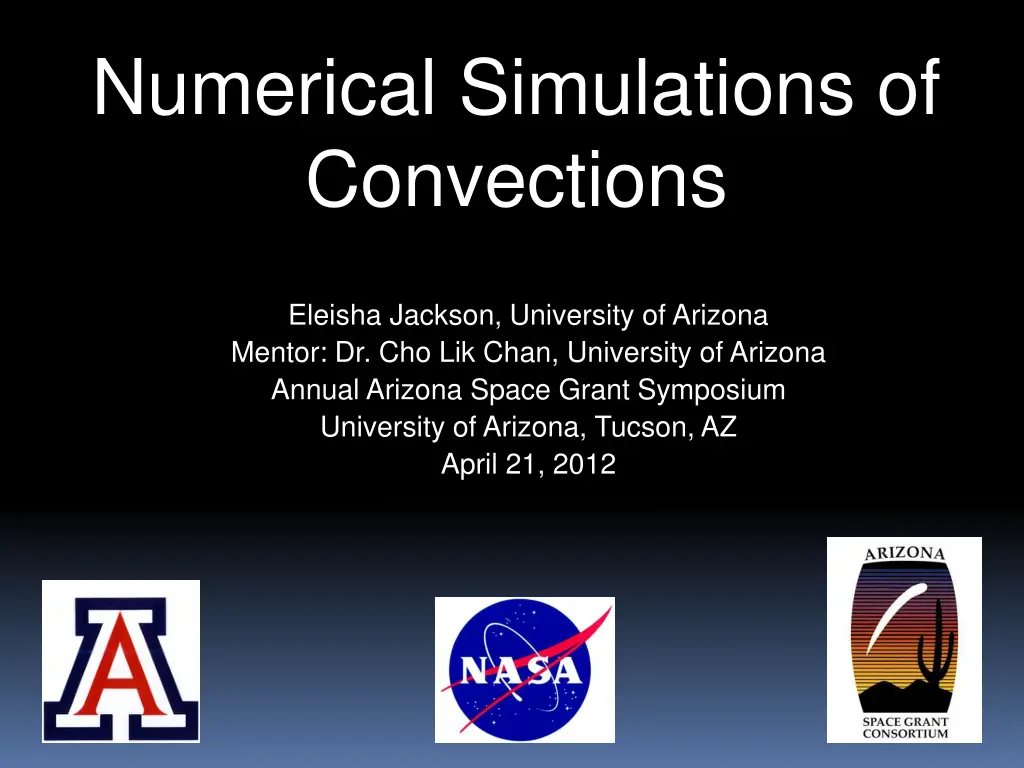
Numerical Simulations of Convections and Rayleigh-Bénard Convection Study
Explore the research on numerical simulations of convections conducted by Eleisha Jackson at the University of Arizona, focusing on solving differential equations using MATLAB and the Pseudo-Spectral Collocation Method. The study delves into fluid flow phenomena, specifically Rayleigh-Bénard Convection, highlighting instabilities and results at various Rayleigh numbers. Future work includes investigating different convection phenomena and their effects.
Download Presentation

Please find below an Image/Link to download the presentation.
The content on the website is provided AS IS for your information and personal use only. It may not be sold, licensed, or shared on other websites without obtaining consent from the author. If you encounter any issues during the download, it is possible that the publisher has removed the file from their server.
You are allowed to download the files provided on this website for personal or commercial use, subject to the condition that they are used lawfully. All files are the property of their respective owners.
The content on the website is provided AS IS for your information and personal use only. It may not be sold, licensed, or shared on other websites without obtaining consent from the author.
E N D
Presentation Transcript
Numerical Simulations of Convections Eleisha Jackson, University of Arizona Mentor: Dr. Cho Lik Chan, University of Arizona Annual Arizona Space Grant Symposium University of Arizona, Tucson, AZ April 21, 2012
Research Goals Solving a differential equation analytically may not be possible MATLAB and Pseudo-Spectral Collocation Method used to find solutions Approximate the solution by sum of known functions, e.g. Chebyshev polynomials Explore fluid flow and convection phenomena Focus on Rayleigh-B nard Convection (RBC)
Rayleigh-Bnard Convection Henri B nard and Lord Raleigh Convection in a shallow horizontal layer of a fluid heated from below g = acceleration of gravity T = temperature difference d = spacing between plates = thermal expansion coefficient = thermal diffusivity = viscosity Instability at R = 1708 1. Ahlers, G .(2006) Experiments with Rayleigh-B nard Convection. In Mutabazi, I., Wesfreid, J. &, Guyon, E., In Dynamics of Spatio-Temporal Cellular Structures (67-94) Springer Berlin / Heidelberg
Rayleigh-Bnard Convection 3 2 1 1. Rayleigh-B nard convection. (2012). Rayleigh-B nard convection. Retrieved April 11, 2012 from http://www.enotes.com/topic/Rayleigh-B%C3%A9nard_convection Rayleigh-B nard Instabilities in Nematics. Rayleigh-B nard convection. Retrieved April 11,2012 from http://www.lps.u-psud.fr/Collectif/gr_15/R_B_Inst_LC.htm Viva La Evolucion!. (2006). Rayleigh Benard Convection. Retrieved April 11 ,2012 , from http://vivalaevolucion.blogs.ie/2006/01/ 2. 3.
Results Rayleigh Number = 500
Results Rayleigh Number = 1708
Results Rayleigh Number = 7000
Results Rayleigh Number = 500 Rayleigh Number = 1708 Rayleigh Number = 7000
Future Work and Further Applications Investigate different convection phenomena Investigate effects of thermal diffusivity, thermal coefficient, viscosity on convection phenomena Use this method to solve other equations, e.g. double diffusive convection
Thank You Arizona/NASA Space Grant Consortium University of Arizona Dr. Cho Lik Chan Eric Wilder
Results Rayleigh Number = 500
Results Rayleigh Number = 1708
Results Rayleigh Number = 7000





















